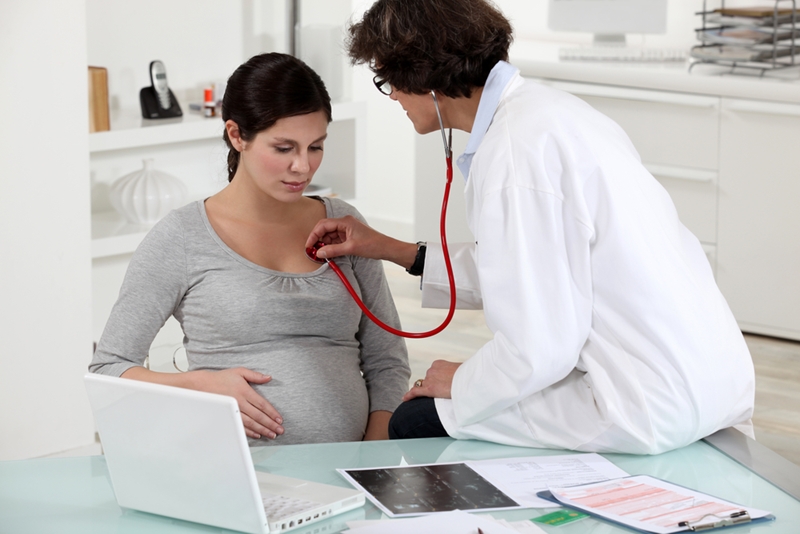
With National Women's Health Week in our midsts, now is the perfect time to focus on the relationship between dental health services and pregnancy. Expectant mothers are understandably cautious about taking risks that could potentially harm the health of their unborn child, but they also need to take their own well-being into account. Too many women neglect going to the dentist for fear that the medications or procedures will harm their babies. Unfortunately, avoiding the dentist's office is actually counterproductive. Pregnant women are more prone to some oral health issues and need to take extra precaution to protect the health of their babies and themselves.
Dental health risks during pregnancy
Women who are pregnant are at greater risk for some oral health issues because of the increase in hormonal changes, making routine dental health services even more important. For example, many women experience pregnancy gingivitis, especially during the third trimester.1 Gingivitis is a gum disease in which bleeding, irritation and inflammation frequently occur in the mouth. Home care to relieve the pain associated with gingivitis includes rinsing with salt water.
"Women who are pregnant are at greater risk for some oral health issues."
However, home remedies are no substitute for a visit with the dentist. If left untreated, gingivitis can turn into periodontitis. At this stage of gum disease, plaque adheres to the teeth and gums and can create infections in the oral cavities, which can spread throughout the body. The damage done through periodontitis can cause teeth to become loose or even lost.
Morning sickness, hyperemesis gravidarum and gastric reflux are common side effects of pregnancy, and they can cause serious damage to your teeth. The gastric acid that comes from the stomach into the mouth may cause tooth erosion. In fact, just four occurrences of these symptoms in one day are enough to cause erosion of the enamel.2 Since pregnant women already experience an influx of gastric acid, they should avoid foods with high acidity to prevent further dental damage. Sour-tasting fruits like cherries and lemons, sugary sports drinks and soda all have high acidity levels.
Mom's dental health and the baby
Avoiding the dentist during pregnancy not only takes a toll on the dental health of mothers, but letting oral diseases progress can also harm the unborn child. The periodontitis stage of gum disease can send harmful bacteria into the bloodstream, causing problems with the respiratory system, circulatory and reproductive systems as well as vital organs. Researchers believe that when bacteria from periodontitis enters the bloodstream, it could affect the fetus and cause premature labor and low-birth-weight (PLBW) babies.3 After all, between 30 and 50 percent of all PLBW deliveries are caused by an infection in the pregnant mother, and periodontitis is an infection in the oral cavity.4 Often times, preterm labor exposes infants to negative health consequences and it causes the majority of neonatal mortalities.5
 Part of your prenatal care routine should involve a visit to the dentist.
Part of your prenatal care routine should involve a visit to the dentist.Don't fear the dentist
Many women are afraid to go to the dentist during pregnancy, as they may be concerned certain medications and dental health services are harmful to their unborn baby. In fact, according to one postpartum survey from the Pregnancy Risk Assessment Monitoring System, more than half of the mother respondents did not have dental care or get their teeth professionally cleaned during their pregnancies.6 X-rays are commonly taken in dentists' offices, and, as evidenced by the survey, many women feel this may put their child at risk. Unfortunately, these myths are misplaced, and women are missing out on crucial health services. Going to the dentist as a form of prenatal care is extremely important, as evidenced by the previous explanation on oral health conditions associated with pregnancy.
Here is why dental X-rays are harmless during pregnancy: Rads are the measurement units associated with radiation released from X-rays procedures. The medically accepted cumulative fetal dose is about 5 rad.7 A dental X-ray only exposes the fetus to 0.0001 rad, which means a pregnant woman would have to receive over 50,000 examinations before it could become a problem. Therefore, getting a single, or even several, X-rays at the dentist's office is harmless to an unborn child.
Pregnant women should keep an open conversation between their dentist and obstetrician/gynecologist. Prenatal care expands into all areas of the body, and the mouth is no exception.
1. "Committee Opinion No. 569: Oral health care during pregnancy and through the lifespan," American College of Obstetricians and Gynecologists, August 2013. http://www.acog.org/Resources_And_Publications/Committee_Opinions/Committee_on_Health_Care_for_Underserved_Women/Oral_Health_Care_During_Pregnancy_and_Through_the_Lifespan
2. "The Causes of Acid Erosion," Pronamel. https://www.pronamel.us/tooth-erosion/causes-of-acid-erosion.html
3. "Periodontitis: A risk for delivery of premature labor and low-birth-weight infants," Saini, Rajiv et. al., Journal of Natural Science, Biology and Medicine, 2010. http://www.jnsbm.org/article.asp?issn=0976-9668;year=2010;volume=1;issue=1;spage=40;epage=42;aulast=Saini
4. "Periodontitis, a true infection," Saini, Rajiv et. al., Journal of Global Infectious Diseases, 2009. http://www.ncbi.nlm.nih.gov/pmc/articles/PMC2840950/
5. "Periodontal infection and preterm birth: results of a prospective study," Jeffcoat, MK et. al., U.S. National Library of Medicine. http://www.ncbi.nlm.nih.gov/pubmed/11480640/
6. "Racial/ethnic disparities in maternal oral health experiences in 10 states, pregnancy risk assessment monitoring system, 2004-2006," Hwang, SS et. al., U.S. National Library of Medicine. http://www.ncbi.nlm.nih.gov/pubmed/20652385
7. "Safety of Radiographic Imaging During Pregnancy," Toppenberg, Kevin S. et. al., American Academy of Family Physicians, April 1, 1999. http://www.aafp.org/afp/1999/0401/p1813.html
